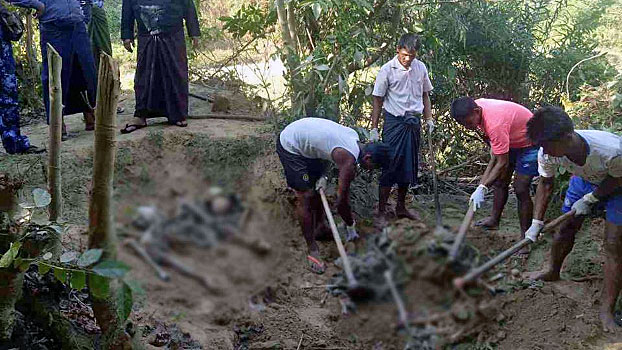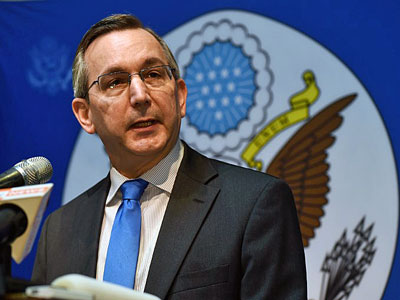Myanmar military releases details about killing of Rohingya villagers
| Publisher | Radio Free Asia |
| Publication Date | 11 January 2018 |
| Cite as | Radio Free Asia, Myanmar military releases details about killing of Rohingya villagers, 11 January 2018, available at: https://www.refworld.org/docid/5a94282aa.html [accessed 21 May 2023] |
| Disclaimer | This is not a UNHCR publication. UNHCR is not responsible for, nor does it necessarily endorse, its content. Any views expressed are solely those of the author or publisher and do not necessarily reflect those of UNHCR, the United Nations or its Member States. |
2018-01-11
 Myanmar laborers dig up the remains of unidentified bodies from a mass grave where soldiers buried Rohingya Muslims they killed in Inn Din village, Maungdaw township, western Myanmar's Rakhine state, Dec. 19. 2017. Photo courtesy of Office of Commander-in-chief of Myanmar's Armed Forces/Facebook
Myanmar laborers dig up the remains of unidentified bodies from a mass grave where soldiers buried Rohingya Muslims they killed in Inn Din village, Maungdaw township, western Myanmar's Rakhine state, Dec. 19. 2017. Photo courtesy of Office of Commander-in-chief of Myanmar's Armed Forces/Facebook
Myanmar's military has issued details of the findings of an investigation team that examined soldiers' role in the extrajudicial killings of 10 Rohingya during the brutal crackdown in northern Rakhine state.
The military issued a rare admission on Wednesday that some of its troops killed what it said were Muslim "terrorists" in September and buried their bodies in a mass grave in Inn Din village in Maungdaw township, which along with neighboring Buithdaung and Rathedaung townships, was the epicenter of recent violence against the Rohingya.
A five-member military team led by Lieutenant General Aye Win from the office of military commander-in-chief Senior General Min Aung Hlaing began investigating the scene on Dec. 20 to determine whether security forces were involved, after the army received information from an unidentified person that bodies were buried in the village.
The team questioned soldiers, members of the border guard force, security police officers, Inn Din villagers, and six civil servants until Jan. 2, said a press release issued by the military investigative team on Wednesday in Naypyidaw.
Relations between ethnic Rakhine Buddhists and Rohingya Muslims who lived in separate areas in the Inn Din village tract grew tense following deadly small-scale attacks by Muslim militants on border guard stations on Oct. 9, 2016, which triggered a crackdown by security forces.
A larger attack on police outposts by the same group on Aug. 25, 2017, sparked another crackdown that forced 655,000 Rohingya to flee to Bangladesh where some accused the military of committing random killings, rape, and arson in their villages in northern Rakhine.
The same day, Rohingya "terrorists" captured and killed Maung Ni, an ethnic Rakhine resident of Inn Din village as he was on his way to farm, and other Rohingya began to threaten Rakhine villagers with sticks and swords, the statement said.
The "Bengalis," a derogatory term for the Rohingya who are seen as illegal immigrants from Bangladesh, chanted over loudspeakers about slashing the throats of Myanmar soldiers and occupying the region. The ethnic Rakhine villagers panicked and went to a local Buddhist monastery, the statement said.
Security forces stationed at Inn Din village were then attacked by about 200 Rohingya brandishing sticks and swords on Sept. 1. They fired guns into the air, scaring off the group except for 10 who were arrested, it said.
During an interrogation at the village school, the Rohingya said they had connections with terrorists and were persuaded by Muslim religious scholars to carry out terrorist acts, the statement said.
Although the soldiers should have handed over the 10 men to police, they decided to kill them at a local cemetery on Sept. 2, because Rohingya terrorists had carried out other attacks by landmines and set fire to two police vehicles in Thinbawgwe village, the statement said.
Security forces escorted ethnic Rakhine residents of Inn Din who led the way to the cemetery where the 10 Rohingya villagers, including Maung Ni's sons, were ordered to get into a pit in a ravine between two hillocks. An ethnic Rakhine villager cut them with a sword and four soldiers shot them, the statement said.
The military investigation team suggested that the killings were an act of vengeance.
"It was found that local ethnics had grievances against those 10 Bengali terrorists involved in the terror attacks and against Bengali villagers who arrested and who had killed U [honorific] Maung Ni without reason, and who threatened and bullied the local ethnics," the statement said.
The statement went on to say that action would be taken against the villagers and soldiers who confessed to the murders as well as against officers to whom the soldiers reported.
Rohingya who fled Inn Din village to seek safety in Bangladesh contend that those killed were all civilians, not terrorists, as the army claims, AgenceFrance-Presse reported on Thursday.
'Unlawful' killings
Responding to the press release, Thein Than Oo, a founding member of the Myanmar Lawyers' Network, questioned the authenticity of the statement.
"The release doesn't look like an official release," he told RFA.
"The statement is like a radio play with a plot," he said, adding that it did not read like a statement, but rather a defense of the military.
"I haven't seen anything like this before when the military admits that soldiers killed people," he said. "This is the first time. The military doesn't have the authority to arrest or kill people, even if they [Rohingya suspects] killed U Maung Ni or not."
Thein Than Oo said that in reality some security guards had probably committed the murders, so the incident is "not the entire military's fault."
"But the military's image will be damaged if it protects these security guards who killed 10 people," he said.
"The military has rules of engagement," he said. "If someone violate these rules, action must be taken against him according to the law. The military should take action against anyone who commits crime. If not, the international community will see the Myanmar Army as an organization that doesn't operate according to the rule of law."
Prominent Myanmar legal activist Robert San Aung said the 10 Rohingya were killed in an "unlawful manner."
"Then the military said it killed them because they had killed a man," he said. "This reason is not acceptable. Killing is killing. If someone is found to have committed murder, then action must be taken against him according to the law."
"But because the military has killed people in an unlawful manner, we are having many problems in the country, mostly in ethnic areas," he said. "This case is a big crime committed by the military."
Kyaw Kyaw Win, a lawmaker in the upper house of the national parliament whose constituency encompasses Maungdaw township, noted that it remains largely unknown whether the 10 Rohingya were terrorists, as the military claims.
"We don't know whether these 10 people were terrorists or not," he said. "Only the security guards and some villagers from Inn Din village would know."
 US Ambassador Scot Marciel delivers an address on Myanmar-US relations in Yangon, May 10, 2016. AFP
US Ambassador Scot Marciel delivers an address on Myanmar-US relations in Yangon, May 10, 2016. AFP
US, EU weighs in
Reuters news agency quoted the U.S. ambassador to Myanmar as calling the revelations "an important step" while calling for more transparency and accountability.
"The military's acknowledgment that the security forces were involved in the killing of these 10 individuals is an important step," Ambassador Scot Marciel said in a forum on media freedom with journalism students and reporters in the commercial capital Yangon.
"We hope it is followed up by more transparency and by holding those responsible accountable," he said. "I would stress this should be done, not as a favor to the international community, but because it's good for the health of Myanmar's democracy."
Meanwhile, the European Union on Thursday called for a credible investigation into Myanmar military's extrajudicial killings.
"These brutal killings confirm the urgent need for a thorough and credible investigation into all violent incidents in northern Rakhine state to ensure the accountability of those found responsible for committing atrocities," said a statement issued by the EU in Yangon.
The Myanmar government has refused to grant entry to the country to a United Nations fact-finding mission appointed under a resolution in March to investigate atrocities that security forces are said to have committed against the Rohingya during the previous four-month security sweep in Rakhine's northern townships that began in October 2016.
In December 2017, the government temporarily barred Yanghee Lee, a U.N. special rapporteur who works with the Office of the High Commissioner for Human Rights, from visiting Myanmar this month to evaluate rights developments, particularly in violence-wracked Rakhine state.
The government said a previous mission report Lee issued was biased and unfair.
The Myanmar government has also barred the media and some international NGOs from entering the conflict zone.
"[T]he EU reiterates its call on the government of Myanmar to cooperate fully with the Human Rights Council's independent international fact-finding mission and other independent observers, including journalists and to provide for their full, safe, and unhindered access to all conflict areas without delay," the EU's statement said.
The U.N. and U.S. have said that the military campaign against the Rohingya has amounted to ethnic cleansing, while others have suggested that the army's actions may constitute genocide.
Reported by Thinn Thiri and Khin Khin Ei for RFA's Myanmar Service. Translated by Khet Mar. Written in English by Roseanne Gerin.
Link to original story on RFA website
